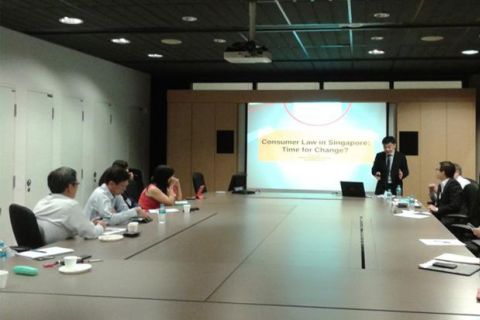The School of Social Sciences (SOSS) hosted its first Psychology and Public Policy Conference-Workshop titled “Is low fertility here to stay or can Singapore make more babies?” at SMU on 10 February 2015. Attended by SMU President Arnoud De Meyer, SMU faculty, staff and students, as well as government and industry partners, the conference focused on the issue of low fertility faced by Singapore and many other countries. Leading international scholars in evolutionary social psychology – a perspective linked to the natural sciences and increasingly being applied to business and the understanding of modern problems – joined in an exciting discussion on this issue.
After a warm welcome by Professor James Tang, Dean of SOSS and Professor of Political Science, the conference Chairperson, Associate Professor of Psychology Norman Li of SOSS, kicked off the event with an overview on this issue. Citing a recent quote from former Minister Mentor Lee Kuan Yew who said that “low birth rates have nothing to do with economic or financial factors”, Professor Li indicated how evolutionary social psychological perspectives may be particularly relevant and useful in studying delayed marriage and low fertility.
This was then followed by engaging plenary talks from a panel of experts: Dr Bussawaran Teerawichitchainan, Assistant Professor of Sociology at SOSS; Dr Bruce Ellis, John & Doris Norton Endowed Chair Professor in Fathers, Parenting, and Families, University of Arizona; Dr Steven Neuberg, Foundation Professor of the Department of Psychology at the Arizona State University; and Dr Mark Van Vugt, Professor of Group and Organisational Psychology at the VU University Amsterdam. These experts shared their research findings and insights on areas such as key sociological factors that underlie low fertility in East and Southeast Asia; Singapore’s policies related to marriage and family; the use of social and evolutionary psychology to solve real-world social dilemmas relating to environmental conservation; quantity-versus-quality reproductive tradeoffs in the psychology of reproductive timing; and “Life History Theory” with particular focus on Singapore’s life history strategy.
The inaugural conference-workshop ended on a successful note as participants had an enjoyable time engaging the speakers in meaningful dialogues about one of the most important issues in our society today.
See More News
Want to see more of SMU Research?
Sign up for Research@SMU e-newslettter to know more about our research and research-related events!
If you would like to remove yourself from all our mailing list, please visit https://eservices.smu.edu.sg/internet/DNC/Default.aspx

